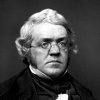“ Competition can at best only reduce the general rate of profit to one level. ”
Karl Marx, Das Kapital (1894). copy citation
| Author | Karl Marx |
|---|---|
| Source | Das Kapital |
| Topic | competition profit |
| Date | 1894 |
| Language | English |
| Reference | |
| Note | |
| Weblink | https://www.marxists.org/archive/marx/works/download/pdf/Capital-Volume-... |
Context
“If the limits of value and surplus-value are given, it is easy to grasp how competition of capitals transforms values into prices of production and further into mercantile prices, and surplus-value into average profit. But without these limits, it is absolutely unintelligible why competition should reduce the general rate of profit to one level instead of another, e.g., make it 15% instead of 1,500%. Competition can at best only reduce the general rate of profit to one level. But it contains no element by which it could determine this level itself.
From the standpoint of merchant's capital, therefore, it is the turnover which appears to determine prices. On the other hand, while the rate of turnover of industrial capital, in so far as it enables a certain capital to exploit more or less labour, exerts a determining and limiting influence on the mass of profit, and thus on the general rate of profit, this rate of profit obtains for merchant's capital as an external fact, its internal connection with the production of surplus-value being entirely obliterated.”
source


